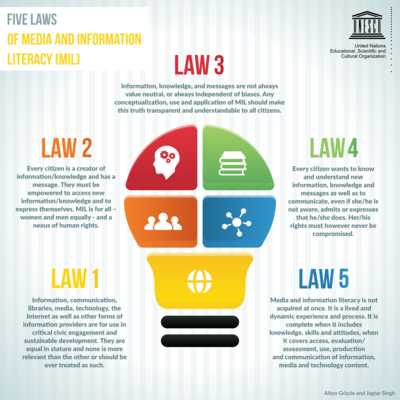Article 19 of the Universal Declaration of Human Rights states that ‘Everyone has the right to freedom of opinion and expression; this right includes freedom to hold opinions without interference and to seek, receive and impart information and ideas through any media and regardless of frontiers.’
We are travelling towards the universality of books, newspapers, the Internet and all forms of “containers of knowledge”. Media and information literacy for all should be seen as a nexus of human rights. Therefore, UNESCO suggests the following Five Laws of Media and Information Literacy.

Law One Information, communication, libraries, media, technology, the Internet as well as other forms of information providers are for use in critical civic engagement and sustainable development. They are equal in stature and none is more relevant than the other or should be ever treated as such.
Law Two Every citizen is a creator of information/knowledge and has a message. They must be empowered to access new information/knowledge and to express themselves. MIL is for all – women and men equally – and a nexus of human rights.
Law Three Information, knowledge, and messages are not always value neutral, or always independent of biases. Any conceptualization, use and application of MIL should make this truth transparent and understandable to all citizens.
Law Four Every citizen wants to know and understand new information, knowledge and messages as well as to communicate, even if she/he is not aware, admits or expresses that he/she does. Her/his rights must however never be compromised.
Law Five Media and information literacy is not acquired at once. It is a lived and dynamic experience and process. It is complete when it includes knowledge, skills and attitudes, when it covers access, evaluation/assessment, use, production and communication of information, media and technology content.
As a critical thinker and a reader, you can now create your very first news about the FR-SRB Galaxy! You can use the following tools to create your news:
Don't forget tne most famous rule about news
It's important to find answers to the foloving 6 questions (5W+1H):
1. Who? (Ko?)
2. What? (Šta?)
3. When? (Kada?)
4. Where? (Gde?)
5. Why? (Zašto?)
6. How? (Kako?)